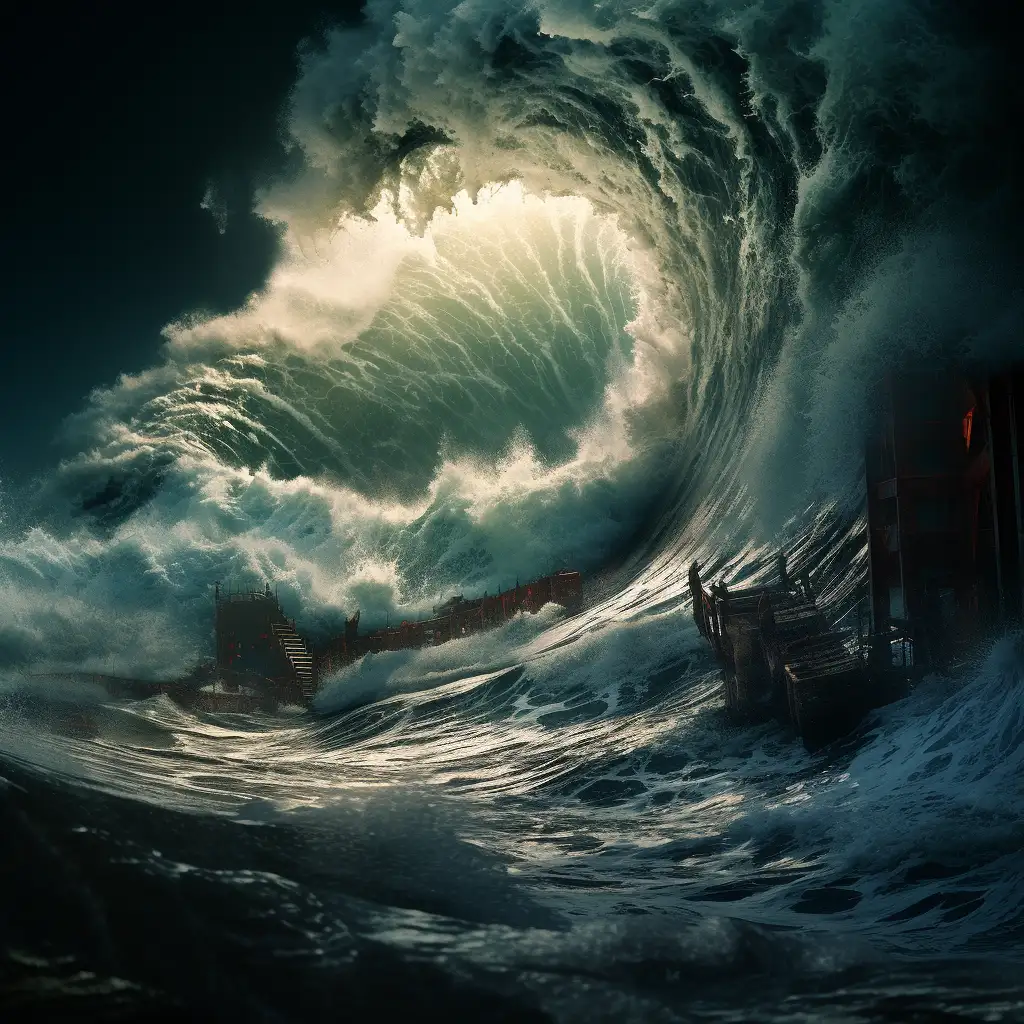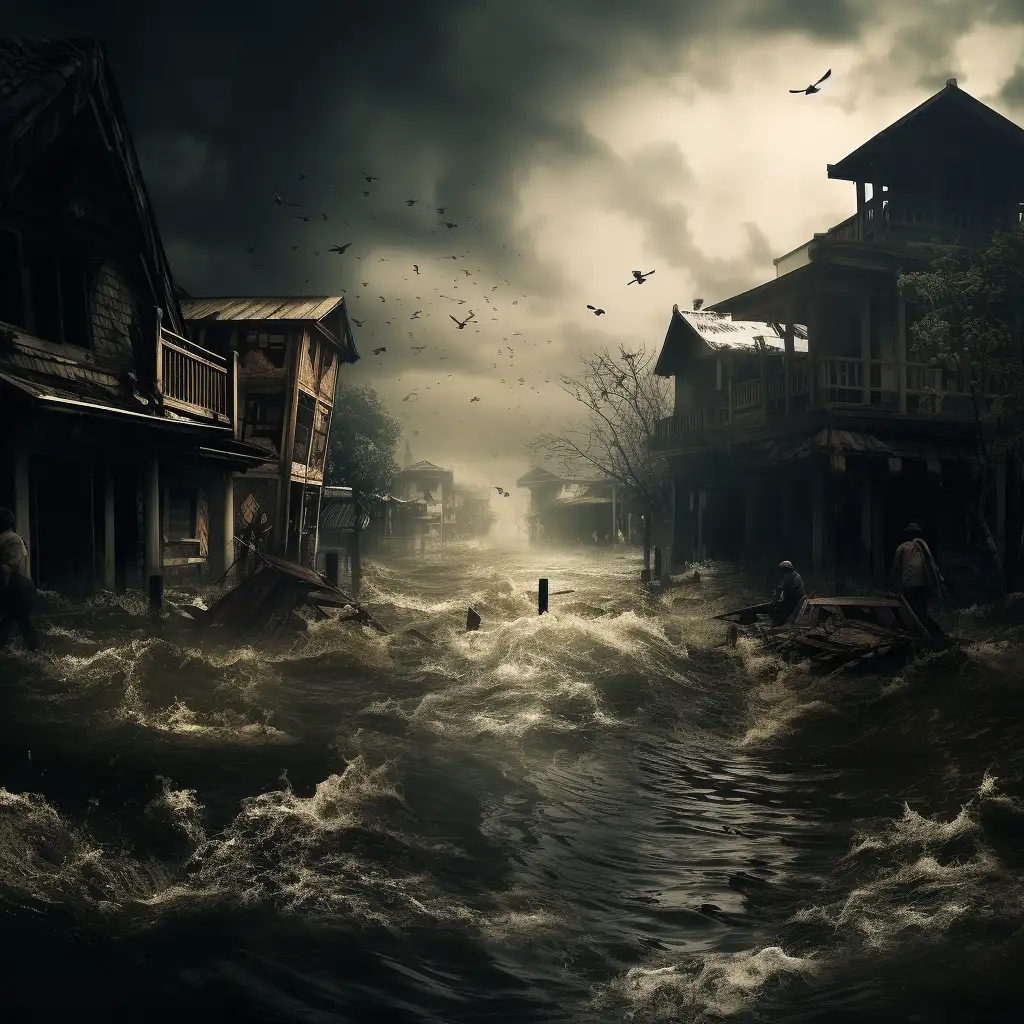Key Takeaways
2. Dreams can be seen as messages from the gods, reflections of inner thoughts and emotions, spiritual journeys, or the brain’s way of processing and organizing information during sleep.
3. Tsunamis symbolize both destruction and potential for personal transformation and growth.
4. Dreaming of a tsunami can represent feelings of being overwhelmed, major life changes, or a need for personal renewal.
5. The interpretation of tsunami dreams depends on individual context and the emotions and details present in the dream.
6. Psychological perspectives, such as Freudian and modern psychology, offer different interpretations of tsunami dreams, including repressed emotions, fear of change, or the brain’s random activity during sleep.
7. Dream interpretation is highly subjective and personal, influenced by the dreamer’s emotions, experiences, and associations with tsunamis.
8. Keeping a dream journal and reflecting on emotions and symbols in the dream can aid in understanding its meaning and using it as a catalyst for personal change.
Have you ever woken up with your heart pounding, the remnants of a tsunami dream still vivid in your mind? Dreaming about such dramatic natural disasters can be unsettling, to say the least. As we delve into this enigmatic subject together, we’ll try to make sense of these powerful nocturnal visions.
The World of Dreams: An Overview
Dreams, those mysterious narratives that fill our nights, have intrigued humanity since time immemorial. Their elusive and often fantastical nature have made them a topic of endless fascination and study.
A Historical Perspective
From the dawn of civilization, dreams have been considered an integral part of human experience. The ancient Egyptians, for example, regarded dreams as messages from the gods, full of symbolic meanings to be deciphered by priests in dream interpretation temples.
The Greeks, too, held dreams in high regard. Their god of dreams, Morpheus, was believed to deliver messages from the gods to mortals in their sleep. The renowned Greek philosopher, Aristotle, contemplated dreams as a reflection of one’s inner thoughts and emotions.
In Native American cultures, dreams were seen as spiritual journeys, opportunities to communicate with the spirit world, or gain wisdom and guidance.
Modern Psychological Theories
Fast forward to more recent times, dreams took center stage in the realm of psychology. Sigmund Freud, often called the father of modern psychology, proposed that dreams are a manifestation of our repressed desires. He saw them as the “royal road to the unconscious,” providing vital clues about the dreamer’s innermost thoughts and feelings.
Carl Jung, a student of Freud, took a different perspective. He saw dreams as a means of communication with the self, and a way to balance the psyche. According to Jung, dreams carry messages from the collective unconscious, a repository of universal human experiences.
Modern cognitive psychology, meanwhile, suggests dreams might be a byproduct of our brain processing and organizing information during sleep.
The Mystery Endures
Despite the progress in understanding dreams, they remain a largely uncharted territory. We’re still not entirely sure why we dream, how dreams form, or their exact purpose. However, this mystery only adds to the allure of dreams, and research continues in pursuit of unraveling their enigmatic nature.
In essence, the world of dreams is a vast, intriguing landscape, filled with mystique and wonder. Whether seen as divine messages, psychological phenomena, or nightly brain exercises, dreams continue to captivate us, inviting us on a journey of exploration and self-discovery.
Understanding the Symbol of a Tsunami
The powerful image of a tsunami carries deep symbolism, both in waking life and in the world of dreams. As we decode this symbol, it’s essential to consider the dual nature of a tsunami—its capacity to destroy and, paradoxically, its potential to pave the way for new beginnings.
Physical Manifestation of a Tsunami
A tsunami, in the physical world, is an enormous sea wave caused by an undersea disturbance, such as an earthquake or volcanic eruption. When it makes landfall, a tsunami is a virtually unstoppable force, causing widespread destruction, altering landscapes and changing lives irrevocably.
Symbolic Interpretation
Symbolically, a tsunami often represents overwhelming emotional turmoil or significant life changes. It embodies the human fear of being swept away by circumstances beyond our control. But, as anyone who has weathered a personal storm knows, such experiences, while painful, often make us stronger and wiser.
The Tsunami: A Paradox
Yet, there’s another side to the tsunami. After the waters recede, life eventually returns. New plants sprout, animals come back, and people rebuild, often emerging more resilient than before. This echoes the cycle of destruction and renewal, death and rebirth.
Dreaming of a tsunami might therefore symbolize not only a sense of being overwhelmed but also the potential for personal transformation and growth. It could represent the sweeping away of the old to make way for the new.
Tsunami Symbolism in Dreams
When a tsunami features in your dreams, it brings with it its rich symbolism. This powerful natural phenomenon may represent feelings of being overwhelmed, possibly by emotions or circumstances in your life. Alternatively, it could be a harbinger of significant changes or transformation.

Tsunamis in Dreams: A Deep Dive
Tsunami dreams, as with any dream, are complex and deeply personal. Interpreting them requires understanding both the universal symbolism of tsunamis and your individual context. Let’s explore some of the common themes that might emerge in tsunami dreams.
The Tsunami as a Symbol of Overwhelm
Often, when a tsunami crashes into your dreamscape, it can signify feelings of being overwhelmed. Maybe you’re juggling too many responsibilities or grappling with intense emotions. The tsunami could represent these pressures, mirroring the sense of being swept away or drowned by your circumstances.
A Signal for Change or Catharsis
A tsunami dream might also symbolize a desire for a fresh start or a significant change in your life. Remember, tsunamis are not only about destruction but also renewal. Just as a real-life tsunami reshapes landscapes, dreaming of a tsunami might symbolize your life being reshaped in profound ways.
Decoding the Details
Details of the dream can add nuances to its interpretation:
- Size of the Tsunami: A small wave might indicate manageable stress or changes, while a massive wave could suggest feeling overwhelmed by insurmountable challenges or major life alterations.
- Witnessing or Experiencing: Are you watching the tsunami from afar or being swept away by it? The former could symbolize perceived threats or worries, while the latter might indicate that you’re in the midst of a turbulent situation or emotional state.
- Survival: If you survive the tsunami in your dream, it might represent resilience and the ability to overcome difficulties. It could also suggest a successful transition or personal transformation.
Remember, these interpretations are not set in stone. Dreams are a personal experience and reflect the dreamer’s individual life situation, feelings, and perceptions.
Psychological Perspectives on Dreaming of a Tsunami
Understanding your dreams of tsunamis can be enriched by examining various psychological viewpoints, each offering a unique lens through which to interpret these powerful visions.
Freudian Perspective
Sigmund Freud, the pioneer of psychoanalysis, saw dreams as the gateway to our unconscious mind. He believed that our dreams were manifestations of our repressed desires and unresolved conflicts. From a Freudian perspective, dreaming of a tsunami might signify repressed emotions or anxiety breaking through to your conscious mind. The powerful wave could symbolize pent-up feelings or desires that are trying to surface.
Jungian Perspective
Carl Jung, on the other hand, saw dreams as a tool for achieving wholeness and balance. He introduced the concept of the ‘collective unconscious,’ a level of unconscious shared with other members of the human species comprising of latent memories from our ancestral past. For Jung, dreaming of a tsunami might symbolize a massive shift or transformation occurring in your life. It might represent powerful forces at work in the unconscious, urging you towards growth and individuation.
Modern Psychology’s Perspective
Modern psychological theories about dreams vary widely, from viewing dreams as a means of emotional regulation to considering them as our brain’s way of sorting and storing memories. In the context of tsunami dreams, modern psychology might suggest that such dreams reflect a fear of change, overwhelming emotions, or a perceived crisis. For example, cognitive theories would suggest dreaming of a tsunami represents your fears and anxieties, while neurobiological theories might suggest the dream results from random brain activity during sleep.
Personal Feelings and Experiences
While these theories provide useful frameworks, it’s essential to remember that dream interpretation is highly subjective and personal. Your emotions, experiences, and personal associations with tsunamis significantly color your dream’s meaning. The fears, hopes, and experiences that you bring into the dream can change its interpretation drastically.
Making Sense of Your Tsunami Dream
Dream interpretation is a highly personal process and making sense of your tsunami dream can be a meaningful journey. Here are a few strategies to help you navigate this journey.
Keep a Dream Journal
Maintaining a dream journal is a powerful tool for recalling and understanding your dreams. Write down your dreams as soon as you wake up when the details are still fresh in your mind. Try to capture not just the events, but also the emotions, symbols, and even colors that stood out.
Reflect on Your Feelings
Your emotions during the dream are key to its interpretation. Ask yourself: “How did I feel during the dream?” Were you afraid as the wave approached? Were you relieved to survive? Or perhaps you felt indifferent or even exhilarated by the tsunami’s power? These feelings can provide crucial insights into what the tsunami symbolizes for you.
Link the Dream to Your Waking Life
Look for connections between your dream and your waking life. Are you currently experiencing a situation that feels overwhelming, as a tsunami might be? Or are you longing for a clean slate, much like the renewal a tsunami brings after its destruction? Making these connections can reveal the relevance of your dream to your current life situation.
Consider Personal Associations
Lastly, consider your personal associations with tsunamis. If you’ve experienced or learned extensively about tsunamis, these experiences could influence your dream’s meaning. Your personal beliefs and experiences always add a unique layer to the interpretation.
Addressing Real-Life Implications
If dreaming of a tsunami is leaving you unsettled or anxious, don’t worry. It’s not a prophecy foretelling disaster. Rather, it’s a message from your subconscious mind, urging you to address something in your waking life. Let’s see how you can use these insights for personal growth and positive change.
Embrace the Call to Action
View dreaming of a tsunami as a call to action. If the dream invokes feelings of being overwhelmed, it might be a signal that you need to address certain emotions or situations in your life that you’ve been sidestepping. Your dream is asking you to face these challenges head-on, to engage with them rather than avoid them.
Catalyst for Change
Use dreaming of a tsunami as a catalyst for change. Just as a tsunami reshapes landscapes, let this dream inspire changes in your life. If the tsunami in your dream brings a sense of renewal or fresh starts, consider what aspects of your life might need a ‘clean slate’. Is there a relationship or job that no longer serves you? Or perhaps a habit or mindset that you need to let go?
Seeking Support
If your dream stirs up distressing emotions or leaves you feeling anxious, don’t hesitate to seek support. This could be a friend or family member who’s a good listener, or a mental health professional who can provide expert guidance. Remember, it’s okay to ask for help when navigating confusing or challenging emotions.
Personal Growth
Finally, see this dream as an opportunity for personal growth. The insights gained from your dream can lead to deeper self-understanding and emotional growth. Whether it’s learning to manage stress better, fostering emotional resilience, or initiating necessary changes, dreaming of a tsunami can be a stepping stone towards personal development.

Common Misconceptions About Dream Interpretation
While the realm of dream interpretation is truly intriguing, it’s also subject to numerous misconceptions. Understanding these myths can help you approach your dream interpretations more effectively.
Misconception 1: Dreams Predict the Future
A widespread misconception is that dreams can predict the future. While it’s true that our subconscious can sometimes pick up on details we miss consciously, and these may appear in our dreams, this doesn’t mean dreams can foresee future events. Dreams reflect our thoughts, feelings, and experiences, not prophetic visions.
Misconception 2: Every Dream Element Has a Universal Meaning
Another common myth is that every object or event in a dream has a fixed, universal meaning. For instance, the assumption that dreaming of a tsunami always symbolizes overwhelming emotions or drastic changes. While certain themes may be common, the specifics of dream interpretation depend heavily on the dreamer’s personal experiences, emotions, and current life situation.
Misconception 3: Dream Interpretation is a ‘One-Size-Fits-All’ Approach
It’s also a mistake to believe in a ‘one-size-fits-all’ approach to dream interpretation. Each person’s dream world is as unique as they are, reflecting their experiences, feelings, fears, and hopes. What a tsunami means in your dream might differ greatly from what it signifies in someone else’s.
Misconception 4: Dreams are Always Significant
While dreams can provide insights into our emotions and experiences, not all dreams are deeply significant or symbolic. Sometimes, a dream is just a dream, influenced by random thoughts, memories, or brain activity during sleep.
Dreaming of a Tsunami: Conclusion
Navigating the world of dreams is an exciting journey, filled with personal discoveries and universal human experiences. Your tsunami dream, as intense and tumultuous as it might be, is a part of this beautiful complexity. Remember, these dreams are deeply personal and unique to your life experiences and emotions.
While they may sometimes stir fear or anxiety, it’s important to remember that these dreams provide an opportunity for reflection, understanding, and growth. So the next time a tsunami wave towers in your dreamscape, remember, you’re not just a hapless dreamer—you’re an explorer charting the wild, wonderful landscape of your inner world.
FAQs
A: Dreams are a reflection of our subconscious mind, and dreaming about tsunamis can symbolize various aspects of our lives. They may represent overwhelming emotions, impending changes, or a sense of powerlessness in the face of challenging situations.
Q: Are dreams about tsunamis always negative?
A: Not necessarily. While tsunamis are often associated with destruction and danger, dreams involving tsunamis can have different interpretations. They can symbolize personal transformation, emotional release, or a need for adaptation and resilience.
Q: Should I be concerned if I have recurring dreams about tsunamis?
A: Recurring dreams, including those about tsunamis, can indicate unresolved issues or significant emotions in your life. It may be helpful to explore the underlying emotions and symbolism of these dreams to gain insight and potentially address any concerns they bring up.
Q: Can dreams about tsunamis predict real-life events?
A: Dreams are generally not considered accurate predictors of specific future events. However, they can provide valuable insights into our emotions, thoughts, and subconscious desires. It’s important to remember that dreams are highly subjective and should not be taken as literal predictions.
Q: Are there any common emotions associated with dreams about tsunamis?
A: Dreams about tsunamis can evoke a range of emotions, including fear, anxiety, powerlessness, awe, or even a sense of liberation. The emotional response often depends on the individual’s personal experiences, current life circumstances, and the specific elements within the dream.
Q: Can I control or change my dreams about tsunamis?
A: Lucid dreaming techniques can potentially help you gain some control over your dreams. However, altering the content or frequency of dreams about tsunamis might require a deeper exploration of the underlying emotions and factors contributing to these dreams.
Q: Are there any cultural or historical interpretations of dreams involving tsunamis?
A: Yes, various cultures have unique interpretations of dreams involving tsunamis. In some traditions, tsunamis symbolize natural forces or divine intervention, representing the balance between the elements and the need for spiritual harmony. It’s interesting to explore different cultural perspectives to gain a broader understanding of the symbolism associated with tsunamis in dreams.
Q: Are there any practical steps I can take to work with my dreams about tsunamis?
A: Absolutely! Keeping a dream journal can be a helpful practice. Recording your dreams immediately upon waking can aid in capturing details and emotions that may fade over time. Regularly reviewing and reflecting on your dream journal can reveal patterns, symbols, or changes in the dreamscape, offering valuable insights. Additionally, engaging in activities such as meditation, visualization, or dream analysis exercises can enhance your understanding and relationship with your dreams.
Q: Can dreams about tsunamis inspire creativity or provide guidance?
A: Dreams, including those featuring tsunamis, have the potential to ignite creativity and offer guidance. Exploring the symbolism and emotions within these dreams can unlock new perspectives and ideas. Artists, writers, and creators often draw inspiration from their dreams, using them as a wellspring of imagination and insight.
Q: Is it possible to prevent or stop recurring dreams about tsunamis?
A: While it’s challenging to completely control or stop recurring dreams, there are steps you can take to potentially reduce their frequency or impact. Exploring the underlying emotions and meanings behind these dreams through therapy, journaling, or self-reflection can contribute to a better understanding of their origin. Engaging in relaxation techniques, establishing a consistent sleep routine, and creating a peaceful sleep environment may also help promote more restful and varied dreams over time.
Q: Can dreams about tsunamis have positive interpretations?
A: Yes, dreams about tsunamis can have positive interpretations depending on the context and emotions within the dream. They can signify emotional release, transformation, or the opportunity for personal growth and resilience. It’s important to consider the overall tone, symbolism, and your own emotional response to the dream to discern its potential positive aspects.







